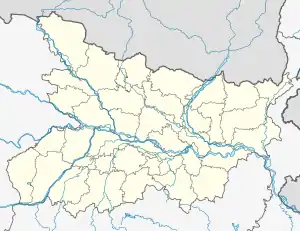
Manihari | |
|---|---|
Town | |
 Manihari Location in Bihar, India | |
| Coordinates: 25°21′N 87°38′E / 25.35°N 87.63°E | |
| Country | |
| State | Bihar |
| Region | Anga |
| District | Katihar |
| Elevation | 31 m (102 ft) |
| Population (2011) | |
| • Total | 26,629[1] |
| Language | |
| • Official | Hindi[2] |
| • Additional official | Urdu[2] |
| • Regional | Angika[3] |
| Time zone | UTC+5:30 (IST) |
| PIN | |
| Lok Sabha constituency | Katihar |
| Vidhan Sabha constituency | Manihari |
| Website | katihar |
Manihari is a town and a notified area in Katihar district in the Indian state of Bihar. Pincode of Manihari is 854113.[4]
Geography
Manihari is located at 25°21′N 87°38′E / 25.35°N 87.63°E.[5] It has an average elevation of 31 m (101 feet). This place is well known for the Manihari ghat, which connects it to Sakrigali Ghaat, which is situated on the southern bank of the River Ganges.
The town is located on the northern bank of the river Ganges where it meets the river Koshi, thus making the town prone to flooding every year. Manihari is a small border town between the states of Bihar and Jharkhand. Sahebganj is the district town of Jharkhand which is 9 km from Manihari (nautical mile distance); there is regular ferry service. Chief Minister Nitish Kumar flagged off the first passenger train on the newly converted Broad gauge (BG) section of Katihar-Manihari in Katihar division of North-East Frontier Railway (NFR) at Katihar station. There are few local trains which run between Manihari and Katihar.
The geography of Manihari is unique. The river Ganges (i.e. Ganga) flows eastward up to Manihari and takes a southward turn after Manihari. Thus, Manihari is known as the point of River Ganges's sharp bend leading its eastward water flow to turn to southward water flow.
Manihari Ghat
Before the Farakka Barrage over the Ganges was constructed, people going to the Darjeeling Hills or North Bengal from Kolkata, used to travel by broad gauge train to Sakrigali Ghat and then cross the Ganges by steamer. On the other side of the river at Manihari Ghat, they used to take a metre gauge train to Siliguri.[6] Once Farakka Barrage became operational in 1975 (the barrage has a broad gauge rail line on it), this route became redundant. There still is a ferry service linking Manihari Ghat with Sahebganj.
Demographics
As of 2001 India census,[7] Manihari had a population of 21,783. Males constitute 53% of the population and females 47%. Manihari has an average literacy rate of 44%, lower than the national average of 59.5%: male literacy is 52%, and female literacy is 35%. In Manihari, 19% of the population is under 6 years of age.
As of 2011 India census,[8] Manihari had a population of 26,629.
References
- ↑
- 1 2 "52nd REPORT OF THE COMMISSIONER FOR LINGUISTIC MINORITIES IN INDIA" (PDF). nclm.nic.in. Ministry of Minority Affairs. Archived from the original (PDF) on 25 May 2017. Retrieved 4 October 2019.
- ↑ Masica, Colin P. (9 September 1993). The Indo-Aryan Languages. Cambridge University Press. p. 12. ISBN 978-0-521-29944-2.
- ↑ MANIHARI Pin Code, Search MANIHARI KATIHAR PinCode. Citypincode.in. Retrieved on 2020-02-27.
- ↑ Falling Rain Genomics, Inc - Manihari. Fallingrain.com. Retrieved on 2020-02-27.
- ↑ "my school i wish". Madhyamgram Re-visited after 15 years. Retrieved 23 January 2011.
- ↑ "Census of India 2001: Data from the 2001 Census, including cities, villages and towns (Provisional)". Census Commission of India. Archived from the original on 16 June 2004. Retrieved 1 November 2008.
- ↑ "Census of India 2011". Census Commission of India. Retrieved 30 September 2016.